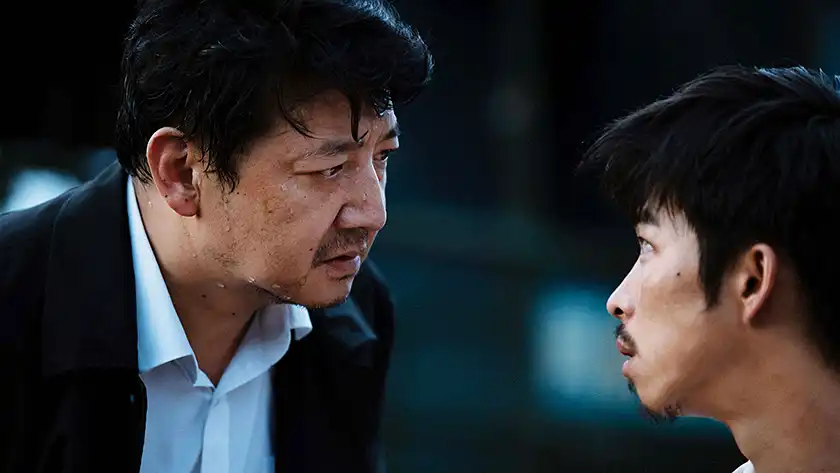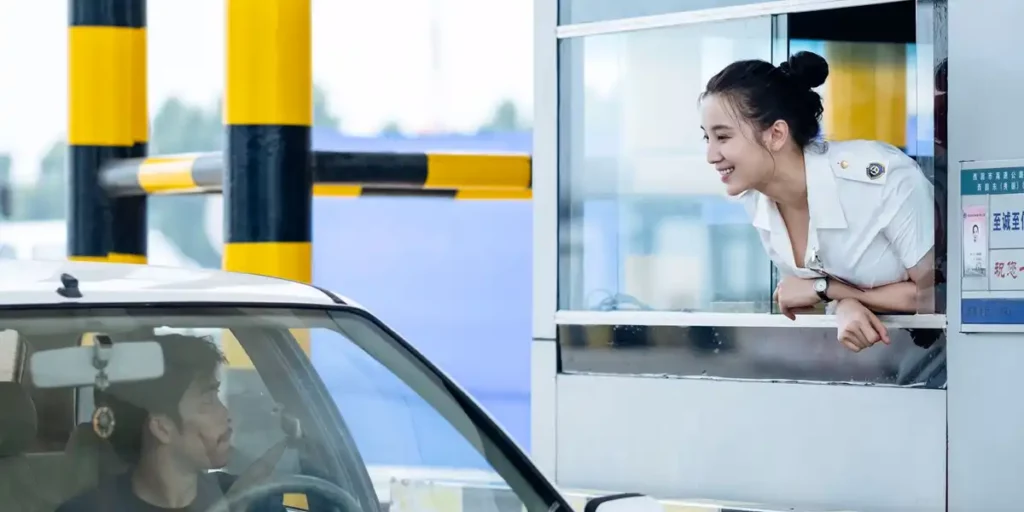Back to the Wharf ’s basic premise is intriguing and potentially powerful but it becomes cluttered with odd directorial, design and writing choices.
There are moments which levitate Back to the Wharf into a film that has meaning and power. Moments like the terrific Yu Zhang (playing the main character Song Hao as an adult) looking directly into the camera, eyes clouded with tears, saying as much in his silence as he does with the stripped-back lines he has, or moments of shared secrets and grief examined in the central father-son relationship. But for all its effective moments, Back to the Wharf has even more ineffective ones. It runs just shy of two hours – not a long film in any respect – but still manages to outstay its welcome. Back to the Wharf could have been cut by 30 minutes, which would have helped remove the characters and plots that hold little weight and only add to the dissatisfaction. The basic plot is promising, but there is a density to Back to the Wharf which unfortunately renders it all rather blunt.
The opening 30 minutes start out confidently enough; teenager Song Hao (in his younger years played by Zhou Zhengjie) plays on a game at an arcade before heading to school for the afternoon. The camera follows him around with a floating, composed style. We are drawn into his life and his surroundings. As this relatively normal existence proceeds, tragedy strikes, first with Song Hao’s quota from his school being rejected and given to another student, and then with Song Hao’s consequent actions. Song Hao, breaking into a house to confront the other student, enters the wrong one and in the following scuffle, he stabs the owner.
And so, the story begins: Song Hao leaving his parents and his home in the dead of night, guilty of manslaughter and now a ghost in the world for the rest of his days. It is a promising premise, made all the more so by the fact that the homeowner he killed has a young baby who will now be an orphan. After 15 years of ‘hiding’ and living alone, circumstances force Song Hao back to his hometown.
Here is where Back to the Wharf becomes confused. The best direction it could have gone down would have been to follow the guilt-ridden Hang Sao in his relationship with his father, Song Jianfei (a powerful Wang Yanhui), adding in meetings and forced confrontation with the orphan, Wan Xiaoning (Deng Enxi, effective in what little screentime she has), who is now a teenager. And for a portion of the film at least, it does this, but it also adds in an odd, inexplicable romance as well as an underdeveloped plot consisting of blackmail and political corruption. None of the aspects are given enough time to breathe as it skitters from plot-to-plot, particularly when considering the melodramatic tendencies of the acting, screenplay and direction. Odd moments of slow-mo and blurry camera effects do little to make things more comprehensible. Back to the Wharf is not a subtle film, it’s more an over-the-top drama which screams with dramatic intent every chance it gets.

However, some strange camerawork moments aside, DP Piao Songn shoots the whole film impressively. He uses the surroundings to great effect, be it the light reflecting hazily onto Song Hao’s face in troubling moments or drawing out the loneliness he feels through the capturing of the harsh, empty fringes of his hometown. The setting is as much a character as the people themselves, which is testament to Piao Songn’s stylish and intelligent cinematography. And, when Li Xiaofeng values subtlety and intelligence in his direction, Back to the Wharf shows its glimpses of potential, before an odd style choice or the full-on melodrama comes back to wipe the glimmer out.
A large portion of Back to the Wharf is built on a troubling concept. On his return to his hometown, Hang Sao is pursued by an old schoolmate, Pan Xiaoshuang (Song Jia), a pursuit which continues for a good 20 minutes. He tells her he is not interested in inevitable exasperation. In response she straddles him, despite his protests, before slapping him and casting doubt on his lack of attraction to her. They finally kiss and so the romance begins, a central romance built on sexual assault but troublingly never viewed in the film as sexual assault; instead, the act is fully accepted and the viewer is expected to appreciate their ensuing romance.
It is enough to call into question the film as a whole, adding confusion to the characters and their relationships even more. Even aside from the assault, the romance is never built in a convincing fashion and Pan Xiaoshuang’s fixation on Hang Sao is only fleetingly explained. For a drama like Back to the Wharf to be effective, clarity in the characters and relationships is vital – Li Xiaofeng’s drama is unable to grasp that clarity.
The concept of chain reactions, how every action has a consequence, has been grappled with by countless films; Back to the Wharf tackles this gallantly and for the most part succeeds in its attempt. Song Hao is forced into actions later in the film, some of them hurting others physically and mentally, which never would have happened had he not committed manslaughter or even if he had turned himself on that fateful day to the police. It is a shame then that Back to the Wharf dampens this concept with too many ideas. Is it a film about guilt, political corruption, romance, blackmail? It seems to want to be about all of those things, a balance which is not impossible but is certainly very hard to achieve. Density is given value over simplicity in Back to the Wharf, when the latter could have made it a rather special film.
Back to the Wharf was screened digitally at the 2021 Glasgow Film Festival.

